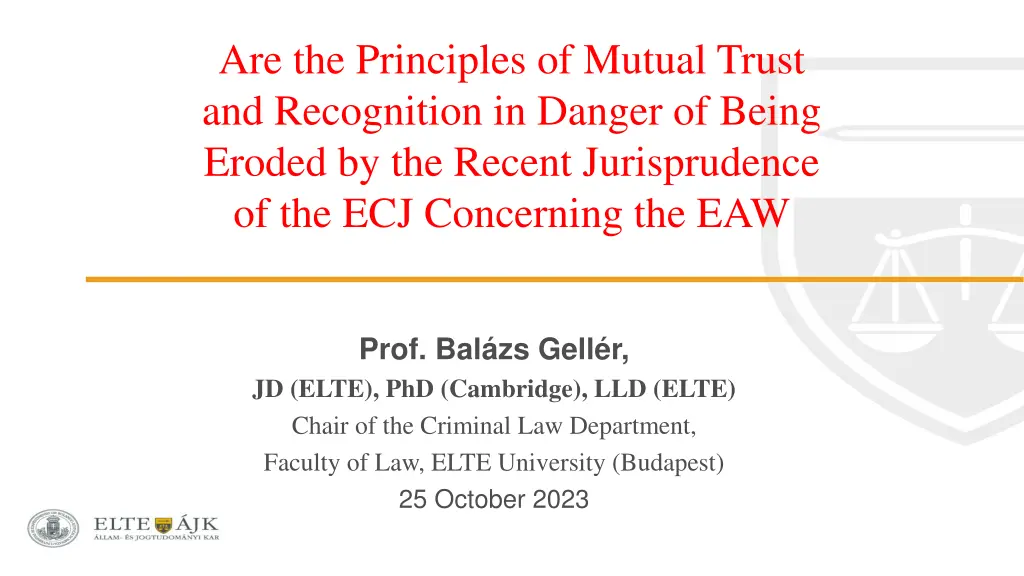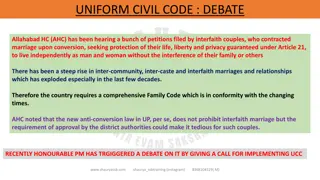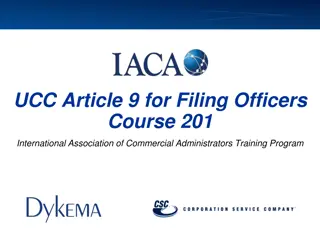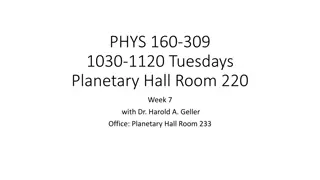
Dangers to Mutual Trust & Recognition in ECJ's EAW Jurisprudence
Explore the erosion risks to mutual trust and recognition by ECJ's recent jurisprudence on European Arrest Warrants (EAW). Delve into key cases, such as AY C-268/17, and how they impact judicial cooperation in criminal matters, as examined by Prof. Balázs Gellér. Understand the implications on the legal framework and the principle of ne bis in idem.
Download Presentation

Please find below an Image/Link to download the presentation.
The content on the website is provided AS IS for your information and personal use only. It may not be sold, licensed, or shared on other websites without obtaining consent from the author. If you encounter any issues during the download, it is possible that the publisher has removed the file from their server.
You are allowed to download the files provided on this website for personal or commercial use, subject to the condition that they are used lawfully. All files are the property of their respective owners.
The content on the website is provided AS IS for your information and personal use only. It may not be sold, licensed, or shared on other websites without obtaining consent from the author.
E N D
Presentation Transcript
Are the Principles of Mutual Trust and Recognition in Danger of Being Eroded by the Recent Jurisprudence of the ECJ Concerning the EAW Prof. Bal zs Gell r, JD (ELTE), PhD (Cambridge), LLD (ELTE) Chair of the Criminal Law Department, Faculty of Law, ELTE University (Budapest) 25 October 2023
Table of Contents I. Mutual trust and Recognition II. Chronology of the Hernadi case III. AY C-268/17 (2018) case (issues of ne bis in idem) III.1. The judgment III.2. Relevant parts of EU law concerning the ne bis in idem principle III.3. G z tok C-187/01 and Br gge C-385/01 (2003) III.4.Van Straaten C-150/05 (2006) and Gasparini C-467/04 (2006) III.5. Turansky C-491/07 (2008) III.6. M. C-398/12 (2014) III.7. Kossowski C-486/14 (2016) IV. The LM C-216/18 PPU (2018) case and its effect on the afterlife of AY and the jurisprudence of the ECJ IV.1. C-404/15 and C-659/15 PPU (2016) IV.2. LM C-216/18 PPU (2018) IV.3. Judgment of the Budapest Capital Court 33.Be .954/2018/3 (23rd August 2018) IV.4. C-562/21 PPU and C-563/21 PPU V. Further developments
CHAPTER 4 JUDICIAL COOPERATION IN CRIMINAL MATTERS Article 82 (ex Article 31 TEU) 1. Judicial cooperation in criminal matters in the Union shall be based on the principle of mutual recognition of judgments and judicial decisions and shall include the approximation of the laws and regulations of the Member States in the areas referred to in paragraph 2 and in Article 83.The European Parliament and the , acting in accordance with the ordinary legislative procedure, shall adopt measures to: (a) lay down rules and procedures for ensuring recognition throughout the Union of all forms of judgments and judicial decisions; (b) prevent and settle conflicts of jurisdiction between Member States; (c) support the training of the judiciary and judicial staff; (d) facilitate cooperation between judicial or equivalent authorities of the Member States in relation to proceedings in criminal matters and the enforcement of decisions.
2. To the extent necessary to facilitate mutual recognition of judgments and judicial decisions and police and judicial cooperation in criminal matters having a cross-border dimension, the European Parliament and the may, by means of directives adopted in accordance with the ordinary legislative procedure, establish minimum rules. Such rules shall take into account the differences between the legal traditions and systems of the Member States. They shall concern: (a) mutual admissibility of evidence between Member States; (b) the rights of individuals in criminal procedure; (c) the rights of victims of crime; (d) any other specific aspects of criminal procedure which the has identified in advance by a decision; for the adoption of such a decision, the shall act unanimously after obtaining the consent of the European Parliament. Adoption of the minimum rules referred to in this paragraph shall not prevent Member States from maintaining or introducing a higher level of protection for individuals.
OPINION 2/13 OF THE COURT (18 December 2014) Para. 168 This legal structure is based on the fundamental premiss that each Member State shares with all the other Member States, and recognises that they share with it, a set of common values on which the EU is founded, as stated in Article 2 TEU. That premiss implies and justifies the existence of mutual trust between the Member States that those values will be recognised and, therefore, that the law of the EU that implements them will be respected.
Para. 191 In the second place, it should be noted that the principle of mutual trust between the Member States is of fundamental importance in EU law, given that it allows an area without internal borders to be created and maintained. That principle requires, particularly with regard to the area of freedom, security and justice, each of those States, save in exceptional circumstances, to consider all the other Member States to be complying with EU law and particularly with the fundamental rights recognised by EU law (see, to that effect, judgments in N. S. and Others, C-411/10 and C-493/10, EU:C:2011:865, paragraphs 78 to 80, and Melloni, EU:C:2013:107, paragraphs 37 and 63).
2002/584/JHA: Council Framework Decision of 13 June 2002 on the European arrest warrant and the surrender procedures between Member States (2) The programme of measures to implement the principle of mutual recognition of criminal decisions envisaged in point 37 of the Tampere European Council Conclusions and adopted by the Council on 30 November 2000(3), addresses the matter of mutual enforcement of arrest warrants. (6) The European arrest warrant provided for in this Framework Decision is the first concrete measure in the field of criminal law implementing the principle of mutual recognition which the European Council referred to as the "cornerstone" of judicial cooperation.
Art. 1 para. 2 2. Member States shall execute any European arrest warrant on the basis of the principle of mutual recognition and in accordance with the provisions of this Framework Decision.
20th Novemeber 2009 USKOK (the Croatian Special Prosecution) starts an investigation whether the contracts between MOL (the then mostly state owned Hungarian oil company) and Croatia were harmful to Croatia. 25th May 2011 RJ (a billioner in pre-trial detention for other crimes) gives a statement (after which he was released), that the then already former Prime Minister of Croatia, Ivo Sanader asked him to arrange for the covert reception and transfer of 10 million Euros which would be coming through different companies from MOL. 10th June 2011 USKOK starts investigation against Hernadi and Sanader and asks Hungary to hear Hernadi as a suspect in the case. 13the September 2011 Hungary refuses the request based on traditional cooperation incriminal matters and starts an investigation based on the same facts.
13th September 2011 Indictment against Sanader but not against Hernadi for bribery. The trial starts on the 17th November 2011. 20th December 2012 The Hungarian Prosecution terminates the case stating that there was no crime committed. Hernadi was never charged only interviewed as a witness. 11th July 2013 A small shareholder submits a criminal report against Hernadi for fraud, embezzlement and bribery.
6th September 2013 The small shareholder submits a private indictment after the case was terminated by the prosecution referring to the previous termination. 7th October 2013 The Budapest Capital Court refuses to execute the EAW against Hernadi citing ne bis in idem (Article 4 para. (3)) (3. Where the judicial authorities of the executing Member State have decided either not to prosecute for the offence on which the European arrest warrant is based or to halt proceedings, or where a final judgment has been passed upon the requested person in a Member State, in respect of the same acts, which prevents further proceedings;)
26th April 2014 Budapest capital Court acquits Hernadi of the fraud and embezzlement charges and terminates the case regarding bribery stating that the small shareholder did not have standing to bring a private prosecution for that crime. 3rd December 2014 The Appeal court that the small shareholder did not have standing as regards bribery and fraud and embezzlement would not be punishable if bribery had been committed since Hernadi would have not been expected to report the illegal usage of these funds.
24th July 2015 The Croatian Constitutional Court quashes the first and second instance judgment convicting Sanader holding that the right to a fair trial was breached to such an extent that a retrial is necessary. 15th December 2015 Second Croatian EAW, Hungary does not respond: no new facts. 25 June 2018 Case C-268/17 AY
International Judgments a) UNCITRAL Judgment (23rd December 2016) Croatia could not prove bribery. b) International Centre for Settlement of Investment Disputes (ICSID) (5th July 2022) There was no bribery and Croatia has to pay substential damages to MOL. c) Swiss Supreme Court (Bundesgericht) (23rd September 2022)4A 69/2022 Refused to annul the UNCITRAL judgment.
III. C-268/17 AY (2018) case (issues of ne bis in idem)
III.1. The judgment Preliminary Questions (1) for an offence on which a European arrest warrant is based or to halt proceedings relates only to the offence on which the European arrest warrant is based or is that provision to be understood as meaning that the cessation or discontinuation of proceedings must also concern the requested person as the suspect/accused in those proceedings? Is Article 4(3) of the Framework Decision to be interpreted as meaning that the decision not to prosecute (2) arrest warrant which has been issued when the judicial authority of the other Member State has decided either not to prosecute for the offence on which the European arrest warrant is based or to halt proceedings where the requested person had the status of a witness and not of a suspect/accused in the proceedings? May a Member State refuse, pursuant to Article 4(3) of the Framework Decision, to execute a European
(3) suspect but was interviewed as a witness constitute, for the other Member States, a ground not to act on the European arrest warrant which has been issued in accordance with Article 3(2) of the Framework Decision? Does the decision to terminate an investigation in which the requested person did not have the status of a (4) the Framework Decision, where the executing judicial authority is informed that the requested person has been finally judged by a Member State in respect of the same acts , and the optional ground for refusal of surrender laid down in Article 4(3) of the Framework Decision, where a final judgment has been passed upon the requested person in a Member State, in respect of the same acts, which prevents further proceedings ? What is the link between the mandatory ground for refusal of surrender laid down in Article 3(2) of (5) required to adopt a decision on any European arrest warrant communicated to it, even where it has already taken a decision on a previous European arrest warrant issued by the other judicial authority against the same requested person in the same criminal proceedings and where the new European arrest warrant is issued because of a change in circumstances in the State issuing the European arrest warrant (decision to refer initiation of criminal proceedings, stricter evidential criteria relating to the commission of the offence, new competent judicial authority/court)? Is Article 1(2) of the Framework Decision to be interpreted as meaning that the executing State is
OPINION OF ADVOCATE GENERAL Mr. SZPUNAR (16 May 2018) Case C-268/17 AY Jurisdiction of the Court of Justice 19. seeks clarification on the execution of that EAW. In this connection, the referring court poses a range of questions on grounds for refusal to execute an EAW provided for in Articles 3(2) and 4(3) of the Framework Decision. 20. This appears odd, as the answer provided by the Court would only concern the executing authorities. In the case at issue the court of the Member State issuing the EAW
Article 1(2) of EAW FD must be interpreted as requiring the judicial authority of the executing Member State to adopt a decision on any EAW forwarded to it, even when, in that Member State, a ruling has already been made on a previous EAW concerning the same person and the same acts, but the second EAW has been issued only on account of the indictment, in the issuing Member State, of the requested person. Article 3(2) and Article 4(3) EAW FD, must be interpreted as meaning that a decision of the Public Prosecutor s Office, such as that of the Hungarian National Bureau of Investigation in question in the main proceedings, which terminated an investigation opened against an unknown person, during which the person who is the subject of the European arrest warrant was interviewed as a witness only, without criminal proceedings having been brought against that person and where the decision was not taken in respect of that person, cannot be relied on for the purpose of refusing to execute that European arrest warrant pursuant to either of those provisions.
III.2. Relevant parts of EU law concerning the ne bis in idem principle Schengen Agreement Artcile 54 EAW framework decision 2002/584/JHA Article 3 (2), 4 (2) (3) Charter of Fundamental Rights Artcile 50 Case-law of the ECJ (FD 2009/948/JHA on ne bis in idem)
III.3. Gztok and Brgge Joined Cases C-187/01 and C-385/01(2003) First landmark case: two sets of criminal proceedings against Mr G z tok (N., G.) and Mr Br gge (G., B.) although proceedings brought in other Member States against the two accused on grounds of the same facts these had been definitively discontinued after they had paid a sum of money determined by the Public Prosecutor as part of a procedure whereby further prosecution was barred Question: Can the termination of criminal proceedings by the prosecution upon payment by the accused set as a condition by the prosecution trigger NBII according to Article 54 of Schengen Agreement? YES
III.4. Van Straaten Case C-150/05 (2006) Gasparini Case C-467/04 (2006) Confirmed and expanded the case law Van Straaten: Idem: movement of drugs between MS (reiterated Van Esbroek) Bis: final decision acquitting for lack of evidence? Yes within Article 54 Gasparini (customs fraud, olive oil, Spain, Portugal): Framework Decision 2002/584 does not preclude the ne bis in idem principle from applying in the case of a final acquittal because prosecution of the offence is time-barred. Article 4(4) of the framework decision permits the executing judicial authority to refuse to execute a European arrest warrant inter alia where the criminal prosecution of the requested person is time-barred according to the law of the executing Member State and the acts fall within the jurisdiction of that State under its own criminal law. In order for that power to be exercised, a judgment whose basis is that a prosecution is time-barred does not have to exist. The situation where the requested person has been finally judged by a Member State in respect of the same acts is governed by Article 3(2) of the framework decision, a provision which lays down a mandatory ground for non-execution of a European arrest warrant. the ne bis in idem principle applies in respect of a decision of a court of a Contracting State, made after criminal proceedings have been brought, by which the accused is acquitted finally because prosecution of the offence is time-barred.
III.5. C-491/07 Vladimir Turansky (2008) The reference was made in criminal proceedings instituted in Austria against Mr Turansk , a Slovak national suspected of having carried out, along with others, a serious robbery on an Austrian national in the territory of the Republic of Austria. The investigations were suspended in Slovakia. Must the bar on a second prosecution for the same acts (ne bis in idem principle) contained in [the CISA] be interpreted as precluding the prosecution of a suspect in the Republic of Austria when criminal proceedings instituted in the Slovak Republic in respect of the same acts, after its accession to the European Union, were discontinued after a police authority, following an examination of the merits of the case and without further sanction, terminated them with immediate effect by ordering their suspension? Answer: The ne bis in idem principle enshrined in Article 54 of the Convention implementing the Schengen Agreement of 14 June 1985 between the Governments of the States of the Benelux Economic Union, the Federal Republic of Germany and the French Republic on the gradual abolition of checks at their common borders, signed in Schengen (Luxembourg) on 19 June 1990, does not fall to be applied to a decision by which an authority of a Contracting State, after examining the merits of the case brought before it, makes an order, at a stage before the charging of a person suspected of a crime, suspending the criminal proceedings, where the suspension decision does not, under the national law of that State, definitively bar further prosecution and therefore does not preclude new criminal proceedings, in respect of the same acts, in that State.
Mantello C-261/09 (2010), para. 4 In view of the shared objective of Article 54 of the CISA and Article 3(2) of the Framework Decision, which is to ensure that a person is not prosecuted or tried more than once in respect of the same acts, it must be accepted that an interpretation of that concept given in the context of the CISA is equally valid for the purposes of the Framework Decision.
III.6. M. Case C-398/12 (2014) Belgian law contained that Where the indictment division has decided that there is no cause to send the case to trial, the accused may not be tried thereafter on the basis of the same facts, unless new facts and/or evidence become available. M, an Italian citizen, resided in Belgium where he was the subject of criminal proceedings in respect of multiple acts of sexual violence or unlawful acts of a sexual nature. The Belgian court of first instance stated that there was no ground to refer the case to a trial court because of insufficient evidence, this decision was upheld by the Appeal Court and the Cour de Cassation. Parallel to this proceeding criminal investigation was carried out in Italy as well. M invoked in the course of that proceedings the ne bis in idem principle. Question: Does a final judgment of non-lieu that terminates criminal proceedings after an extensive investigation, but which permits the proceedings to be reopened in the light of new evidence, given by [a court of] a Member State of the European Union and a party to the Convention Implementing the Schengen Agreement (CISA), preclude the initiation or conduct of proceedings in respect of the same facts and the same person in another Contracting State? Answer: Article 54 of the CISA must be interpreted as meaning that an order making a finding that there is no ground to refer a case to a trial court which precludes, in the Contracting State in which that order was made, the bringing of new criminal proceedings in respect of the same acts against the person to whom that finding applies, unless new facts and/or evidence against that person come to light, must be considered to be a final judgment, for the purposes of that article, precluding new proceedings against the same person in respect of the same acts in another Contracting State.
III.7. Kossowski C-486/14 (2016) The principle of ne bis in idem laid down in Article 54 of the Convention Implementing the Schengen Agreement of 14 June 1985 between the Governments of the States of the Benelux Economic Union, the Federal Republic of Germany and the French Republic on the gradual abolition of checks at their common borders, which was signed in Schengen (Luxembourg) on 19 June 1990, read in the light of Article 50 of the Charter of Fundamental Rights of the European Union, must be interpreted as meaning that a decision of the public prosecutor terminating criminal proceedings and finally closing the investigation procedure against a person, albeit with the possibility of its being reopened or annulled, without any penalties having been imposed, cannot be characterised as a final decision for the purposes of those articles when it is clear from the statement of reasons for that decision that the procedure was closed without a detailed investigation having been carried out; in that regard, the fact that neither the victim nor a potential witness was interviewed is an indication that no such investigation took place.
IV. The LM C-216/18 PPU case and its effect on the afterlife of AY and the jurisprudence of the ECJ
IV.1. Aranyosi and Caldararu C-404/15 and C-659/15 PPU (2016) Article 1(3), Article 5 and Article 6(1) of 2002/584/JHA (EAW) must be interpreted as meaning that, where there is objective, reliable, specific and properly updated evidence with respect to detention conditions in the issuing Member State that demonstrates that there are deficiencies, which may be systemic or generalised, or which may affect certain groups of people, or which may affect certain places of detention, the executing judicial authority must determine, specifically and precisely, whether there are substantial grounds to believe that the individual concerned by a European arrest warrant, issued for the purposes of conducting a criminal prosecution or executing a custodial sentence, will be exposed, because of the conditions for his detention in the issuing Member State, to a real risk of inhuman or degrading treatment, within the meaning of Article 4 of the Charter, in the event of his surrender to that Member State.
IV.2. LM C-216/18 PPU (25th June 2018) In February 2012, June 2012 and September 2013 Polish courts issued three EAWs against LM for the purpose of conducting criminal prosecutions, inter alia for trafficking drugs. LM was arrested in Ireland on the basis of those EAWs and brought before the referring court, the High Court of Ireland. He did not consent to his surrender to Polish judicial authorities. In support of his opposition to being surrendered, he submitted that this would expose him to a real risk of flagrant denial of justice in contravention of Article 6 ECHR and relied, in particular, on the proposal by the European Commission (20th December 2017) in accordance with Article 7(1) TEU.
Article 1(3) of EAW FD, must be interpreted as meaning that, where the executing judicial authority, called upon to decide whether a person in respect of whom a European arrest warrant has been issued for the purposes of conducting a criminal prosecution is to be surrendered, has material, such as that set out in a reasoned proposal of the European Commission adopted pursuant toArticle 7(1) TEU, indicating that there is a real risk of breach of the fundamental right to a fair trial guaranteed by the second paragraph of Article 47 of the Charter of Fundamental Rights, on account of systemic or generalised deficiencies so far as concerns the independence of the issuing Member State s judiciary, that authority must determine, specifically and precisely, whether, having regard to his personal situation, as well as to the nature of the offence for which he is being prosecuted and the factual context that form the basis of the EAW, and in the light of the information provided by the issuing Member State pursuant toArticle 15(2), that there are substantial grounds for believing that that person will run such a risk if he is surrendered to that State.
IV.3. Judgment of the Budapest Capital Court 33.Be .954/2018/3 (23rd August 2018) Refused the execution of the 3rd Croatian EAW - legal bases LM case - EAW FD Article 1 (3) This Framework Decision shall not have the effect of modifying the obligation to respect fundamental rights and fundamental legal principles as enshrined in Article 6 of the Treaty on European Union. - Croatian Constitutional Court judgment and UNCITRAL Judgment (23rd December 2016)
IV.3. C-562/21 PPU and C-563/21 PPU (Neth., Pol.) Article 1(2) and (3) EAW FD must be interpreted as meaning that, where the executing judicial authority called upon to decide on the surrender of a person in respect of whom a EAW has been issued has evidence of systemic or generalised deficiencies concerning the independence of the judiciary in the issuing Member State, in particular as regards the procedure for the appointment of the members of the judiciary, that authority may refuse to surrender that person: For the purposes of executing a custodial sentence or detention order, only if that authority finds that, in the particular circumstances of the case, there are substantial grounds for believing that, having regard inter alia to the information provided by that person relating to the composition of the panel of judges who heard his or her criminal case or to any other circumstance relevant to the assessment of the independence and impartiality of that panel, there has been a breach of that person s fundamental right to a fair trial before an independent and impartial tribunal previously established by law, enshrined in the second paragraph of Article 47 of the Charter of Fundamental Rights of the European Union, and for the purposes of conducting a criminal prosecution, only if that authority finds that, in the particular circumstances of the case, there are substantial grounds for believing that, having regard inter alia to the information provided by the person concerned relating to his or her personal situation, the nature of the offence for which that person is prosecuted, the factual context surrounding that European arrest warrant or any other circumstance relevant to the assessment of the independence and impartiality of the panel of judges likely to be called upon to hear the proceedings in respect of that person, the latter, if surrendered, runs a real risk of breach of that fundamental right.
V. Further developments GN C-261/22 OPINION OF ADVOCATE GENERAL APETA (13 July 2023) (Italy, Belgium) For the first time before this Court, a situation arose where a EAW was issued for the execution of a prison sentence against a mother of a small child. Is the best interest of the child relevant for the execution of such an EAW? (1) European arrest warrant and the surrender procedures between Member States does not, in principle, preclude the refusal to execute an EAW issued against a mother of small children when that is in the best interests of the child. (2) Such a refusal is possible only if, after determining the concrete situation of the child and after using the communication mechanism underArticle 15(2) of the EAW Framework Decision, the executing authority does not have sufficient information that would allow it to be absolutely certain that the execution of the EAW would not go against the best interests of the child. (3) Temporarily postponing surrender underArticle 23(4) of the EAW Framework Decision is not possible for a person other than the requested person and outside the serious humanitarian reasons, for example, where the requested person s life or health is manifestly endangered. Article 1(3) of the Council Framework Decision 2002/584/JHA of 13 June 2002 on the
RO C-327/18 PPU, (19th September 2018) UK issuead two EAWs in respect of RO for the purpose of conducting prosecutions foroffence of murder, arson and rape. He was arrested in Ireland ont he basis of these warrants. he raised objections to his surrender by Ireland on the basis that the UK withdrew from the EU. He argued that he is exposed to the risk that a number of the rights enshrined in the Charger and the EAW FD may no longer be respected by the UK. Article 50 TEU must be interpreted as meaning that mere notification by a Member State of its intention to withdraw from the European Union does not have the consequence that, in the event that that Member State issues a EAW with respect to an individual, the executing Member State must refuse to execute that European arrest warrant or postpone its execution pending clarification of the law that will be applicable in the issuing Member State after its withdrawal from the European Union. In the absence of substantial grounds to believe that the person who is the subject of that European arrest warrant is at risk of being deprived of rights recognised by the Charter of Fundamental Rights of the European Union and EAW Framework Decision following the withdrawal from the European Union of the issuing Member State, the executing Member State cannot refuse to execute that EAW while the issuing Member State remains a member of the European Union.
SN, SD C-479/21 PPU (2021) 1) Can the provisions of the Withdrawal Agreement, which provide for the continuance of the [European arrest warrant (EAW)] regime in respect of the United Kingdom, during the transition period provided for in that agreement, be considered binding on Ireland having regard to its significantAFSJ content; and 2) Can the provisions of the [TCA] which provide for the continuance of the EAW regime in respect of the United Kingdom after the relevant transition period, be considered binding on Ireland having regard to its significantAFSJ content?
Article 50 TEU, Article 217 TFEU and Protocol (No 21) on the position of the United Kingdom and Ireland in respect of the Area of Freedom, Security and Justice, annexed to the TEU and the TFEU, must be interpreted as meaning that Article 62(1)(b) of the Agreement on the withdrawal of the United Kingdom of Great Britain and Northern Ireland from the European Union and the European Atomic Energy Community, read in conjunction with the fourth paragraph of Article 185 thereof, and Article 632 of the Trade and Cooperation Agreement between the European Union and the European Atomic Energy Community, of the one part, and the United Kingdom of Great Britain and Northern Ireland, of the other part, are binding on Ireland.
jbgeller@ajk.elte.hu THANK YOU FOR YOUR ATTENTION!






















